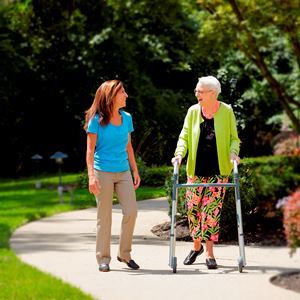More Coronavirus Resources:
Monday, November 3, 2014
Chronic obstructive pulmonary disease (COPD) affects 12 to 24 million Americans and is being diagnosed more frequently than ever before. It is currently the third leading cause of death in the United States and the fourth leading cause of readmissions to hospitals. COPD is a result of damage to the lungs, most commonly caused by smoking, and is usually a mix of two diseases, bronchitis and emphesyma, that affect the person’s ability to breathe. Because it develops slowly, symptoms usually show in middle-aged individuals and senior adults, especially in seniors 65 and older, and can be debilitating, preventing the person from managing basic daily living activities.

While there is no cure for COPD, senior adults affected by this condition can take steps to slow progression of the disease and improve their quality of life.
Self-management for quality of life
Seniors with COPD can take the following self-management measures to help maintain their quality of life. Before embarking on a self-management program, senior individuals should consult with their medical providers.
Stop smoking: Quitting smoking and avoiding second-hand smoke are two key actions individuals with COPD can take to slow progression of the disease.
Exercise: There is very strong evidence that senior adults with COPD who exercise regularly will experience better overall quality of health. In one study, patients with COPD who engaged in very high levels of usual physical activity showed a 46% decline in readmission rates to hospitals.
Maintain a healthy diet: Senior adults with COPD should discuss their nutritional requirements with their doctors. Breathing with COPD uses more energy, so the proper diet is essential to maintaining energy and health.
Breathe clean air: Older adults with COPD should avoid chemical fumes from cleaners and stay indoors when air quality is low.
Get a flu vaccine: Seniors with COPD are at greater risk for getting seriously ill with the influenza virus, which can lead to pneumonia, one of the main infections that precipitates a hospital admission in individuals with COPD.
Be aware of symptoms and interactions: Monitoring the time, dates and activities that precede symptoms can help individuals with COPD provide their physicians with important data for managing their disease.
Follow medical providers’ instructions: Being compliant with medication and oxygen therapy as well as rehabilitation and other doctor’s recommendations can help seniors manage COPD at home and slow the progression of the disease.
Get help at home
As COPD progresses, senior individuals will find that they may not be able to manage daily living activities without help. Seniors or their families may choose to hire an in-home caregiver to help with light housekeeping, running errands and getting to appointments, taking medications, toileting, grooming, and more. Comfort Keepers® in-home care can help seniors with COPD maintain their quality of life for as long as possible within their own homes. For more information on how Comfort Keepers can help, contact your local office today.
References
American Lung Association. (2010). Smoking and older adults. Retrieved from http://www.lung.org/stop-smoking/about-smoking/facts-figures/smoking-and-older-adults.html.
Dunne, P.J. (January 2013). Decreasing hospital readmission after COPD exacerbations. [PowerPoint slides]. Presented at the 23rd Annual Chest Conference and Winter Lung Day. Retrieved from http://action.lung.org/site/DocServer/2013_WTS-DUNNE_lecture_1.pdf?docID=18614.
Elixhauser, A., Au, D.H. and Podulka, J. (September 2011). Statistical brief #121: Readmissions for chronic obstructive pulmonary disease, 2008. The Healthcare Cost and Utilization Project. Retrieved from http://www.hcup-us.ahrq.gov/reports/statbriefs/sb121.pdf.
Guarascio, A.J., Ray, S.M., Finch, C.K. and Self, T.H. (June 14, 2013). The clinical and economic burden of chronic obstructive pulmonary disease in the USA. ClinicoEconomics and Outcomes Research, 5, 235-245.
Morgan, M.D.L. (2003). Preventing hospital admissions for COPD: Role of physical activity. Thorax, 58(2), 95-96. doi: 10.1136/thorax.58.2.95. Retrieved from http://thorax.bmj.com/content/58/2/95.1.full.
National Heart, Lung, and Blood Institute. (n.d.). What is COPD? Retrieved from https://www.nhlbi.nih.gov/health/health-topics/topics/copd/.
Respiratory Health Association. (n.d.). Managing COPD. Retrieved from http://www.lungchicago.org/managing-copd/.
WebMD. (October 16, 2012). COPD (chronic obstructive pulmonary disease)- Living with COPD. Retrieved from http://www.webmd.com/lung/copd/tc/chronic-obstructive-pulmonary-disease-copd-living-with-copd.
WebMD. (October 16, 2012). COPD (chronic obstructive pulmonary disease)-Topic overview. Retrieved from http://www.webmd.com/lung/copd/tc/chronic-obstructive-pulmonary-disease-copd-overview.







